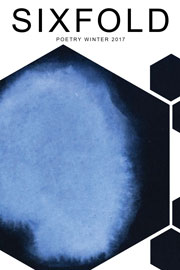
Poetry Winter 2017 fiction all issues

whitespacefiller
Cover Thought-Forms
Laura Apol
On My Fiftieth Birthday I Return
& other poems
Jihyun Yun
Aubade
& other poems
Jamie Ross
Red Jetta
& other poems
Sarah Blanchard
Carolina Clay
& other poems
lauren a. boisvert
Save a Seat for Me in the Void
& other poems
Faith Shearin
A Pirate at Midlife
& other poems
Helen Yeoman-Shaw
Calling Long Distance
& other poems
Sarah B. Sullivan
Iris
& other poems
Timothy Walsh
Metro Messenger
& other poems
Gabriel Spera
Scratch
& other poems
Zoë Harrison
Pattee Creek
& other poems
AJ Powell
Blanket
& other poems
Alexa Poteet
The Man Who Got off the Train Between Madrid and Valencia
& other poems
Marcie McGuire
Still Birth
& other poems
Kim Drew Wright
Elephants Standing
& other poems
Michael Jenkins
The Garden Next Door
& other poems
Nicky Nicholson-Klingerman
Costume
& other poems
Doni Faber
Man Moth
& other poems
M. Underwood
In Other Words
& other poems
Carson Pynes
Diet Coke
& other poems
Bucky Ignatius
Something Old, . . .
& other poems
Violet Mitchell
Deleting Emails the Week After Kevin Died
& other poems
Sam Collier
Nocturne in an Empty Sea
& other poems
Meryl Natchez
Equivocal Activist
& other poems
William Godbey
A Corn Field in Los Angeles
& other poems
Sarah Blanchard
Carolina Clay
All I wanted was to sink a new fencepost,
to replant what the chestnut filly took down last evening
when she bolted at the crack of lightning.
But this red soil bakes hard and dry in the kiln of a southern summer.
My shovel stubs the terracotta earth and bounces off.
My father the farmer would say, So. Use the right tools.
I fetch his hand auger, the brace and bit he used a hundred years ago
to tap the sugar maples in a softer Connecticut climate.
And his 24-pound crowbar, shaped from the front axle
of an ancient Massey Harris tractor.
Before he died, my father showed me how to use a foot-powered grindstone
to sharpen the crowbar’s tapered end.
But I was only thirteen, and alone.
So the steel still bears the marks from the last time he sharpened it for me.
First, the auger.
Sliding my fingers onto the oak spindle and leaning into the earth,
I drill five neat holes into redbrick clay.
Next, the crowbar.
Wrapping my hands over his palmprints and hefting its good balance,
I let the weight drop straight into each hole.
The clay chips and curls away in red-earth flakes.
When the hole is six inches down, I pour in water and let it seep.
A red-shouldered hawk glides above the pines, riding an unseen thermal.
I watch the hawk until the clay softens and melts, terracotta turning to potter’s slip.
I scoop it by handfuls into a sloppy mound.
I wear the clay: my hands and arms are slick.
Ochre presses into pores, smears into sweat.
As they dry, flakes of clay peel off like flayed skin.
My brother the potter would say, The clay lives! You can create beautiful things.
Before he died my brother showed me how to work clay on his wheel,
to turn and shape common earth into elegant vessels.
But I was clumsy and impatient. My pots cracked in the kiln, so I threw them away.
If I can remember what I am made from,
perhaps I can rebuild the broken bits from this red Carolina clay.
Perhaps I can fire this earth into hard red bricks,
trowel my tears into ashes,
and make the mortar to point up what has crumbled.
Sarah Blanchard has recently returned to writing poetry and short fiction after spending several decades as a business teacher, corporate marketer, non-fiction writer, and facility manager for an astronomical observatory in Hawai’i. Several of her early poems were published in Calyx, Welter, Conscience, The Planetary Report, and The Red Fox Review. She currently works as a real estate agent and lives in Raleigh, NC, with her husband, three horses, three dogs and several chickens.
has recently returned to writing poetry and short fiction after spending several decades as a business teacher, corporate marketer, non-fiction writer, and facility manager for an astronomical observatory in Hawai’i. Several of her early poems were published in Calyx, Welter, Conscience, The Planetary Report, and The Red Fox Review. She currently works as a real estate agent and lives in Raleigh, NC, with her husband, three horses, three dogs and several chickens.